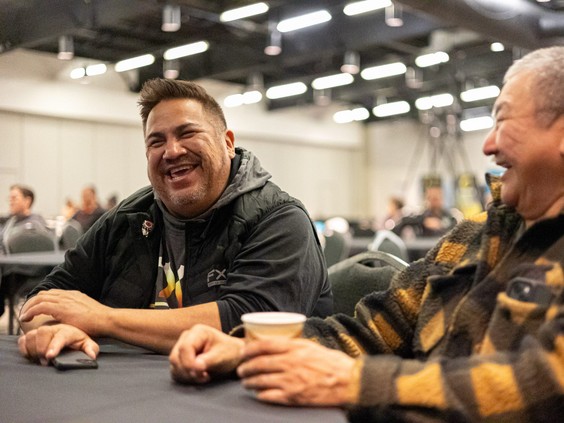
Kimiya Shokoohi
Local Journalism Initiative Reporter
Saskatoon StarPhoenix
Merrick Young has seen first-hand the disparity in how climate change has affected his northern community compared to more urban centres.
The 17-year-old hoped to share that viewpoint this week at a national conference in Saskatoon. The Prince Albert Grand Council organized the Braiding Knowledge for Clean Energy conference, gathering members of Indigenous, rural and remote communities to discuss and devise solutions to the threats caused by climate change.
“I recently moved back to my community and knew something had to change,” said Young, who is from Red Earth Cree Nation, approximately 225 kilometres northeast of Prince Albert.
Due to factors such as land-based practices and geography less subjected to urbanization, these groups often experience the effects of climate change before anyone else. P.A.
Grand Council vice-chief Christopher Jobb noted the numerous rural communities that were displaced and forced to relocate when historic wildfires ravaged the country this summer as evidence of the ripple effects of climate emergencies.
“When you start looking at climate change and what’s happening in our mother region, the wildfires, the flooding, you can see the climate is changing rapidly,” Jobb said.
The three-day conference, which wraps up Wednesday, offers an opportunity for industry and 28 communities across 12 bands to meet. Presentations have covered issues such as energy inefficiencies in on-reserve housing, transition to sustainable energy sources, and countering rising energy costs that disproportionately affect communities in remote areas.
“Braiding knowledge, to me, it’s coming together as a collective to try to find solutions to reassure what we need to do for the next generation of our people and unborn children as well,” said Jobb, a member of Peter Ballantyne Cree Nation.
Many similar issues will be addressed by Indigenous groups at COP28, when world leaders — including a delegation from Saskatchewan — are due to gather in Dubai later this month during the world’s largest conference on climate change.
Premier Scott Moe has said Saskatchewan has prevailing interests around capital and climate and the federal government doesn’t necessarily bring the province’s interests into consideration with its climate-based directives.
Prince Albert Grand Council advisor and Saskatoon conference organizer Robin McLeod questions whether politicians understand the issues beyond scientific data and the economic tallies. The federal 2030 Emission Reduction Plan requires the Canadian economy to achieve net-zero carbon pollution by 2050.
McLeod participated at the national biodiversity conference COP15 in Montreal last December, where he echoed his concerns.
“We talked about trying to convince science that it’s not just about science. Indigenous knowledge has to be blended in the decisions they make,” McLeod said.
During the conference this week at World Trade Center Saskatoon, around 190 registrants from industry and communities gathered to network, discuss and offer their expertise and insights. Jobb suggested that a simple way forward involves collaborative measures across communities.
“Western and First Nations can come together and we can adapt to this change,” he said. “We can work together.”
Kimiya Shokoohi is the Local Journalism Initiative reporter for the Saskatoon StarPhoenix. The LJI program is federally funded by the Government of Canada.

